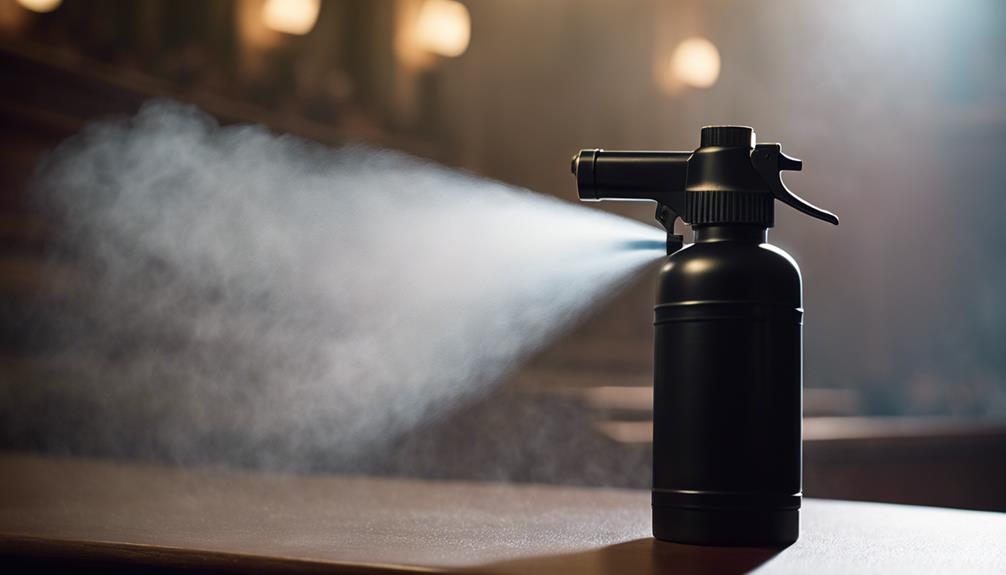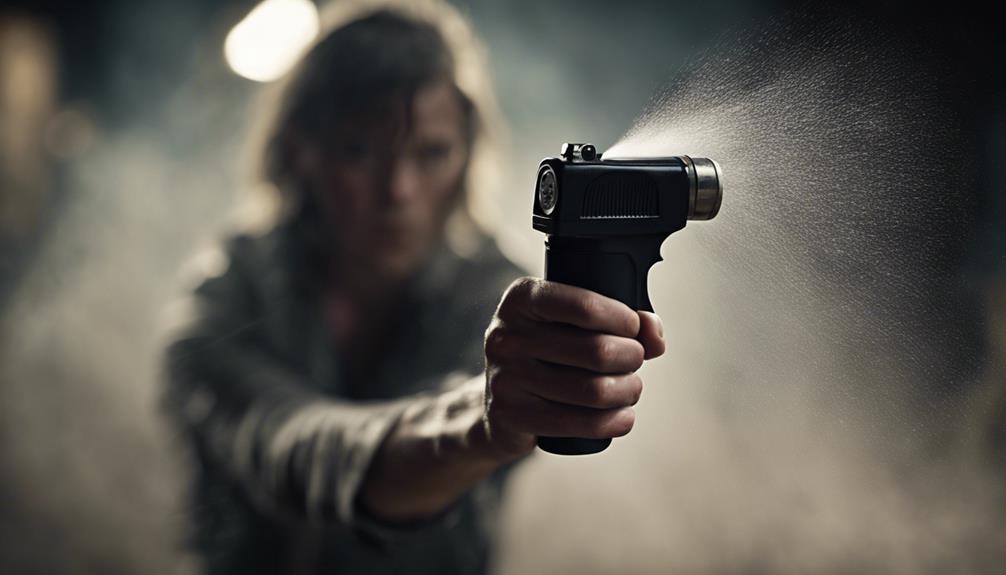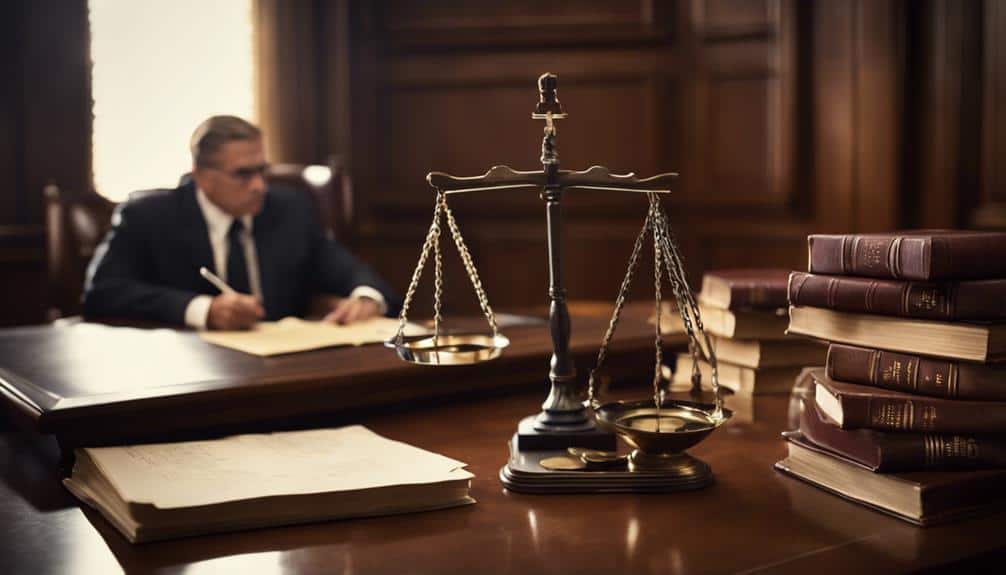You might wonder if using pepper spray on someone who spits on you is justified, but
self-defense laws are quite specific. Spitting, while certainly offensive and potentially harmful, usually doesn’t meet the threshold of an
imminent physical threat required to justify such a reaction. Self-defense actions must be
proportional to the danger you perceive, and misuse of pepper spray can result in
serious legal consequences, including assault charges. So, what should you consider before deciding to use pepper spray in such situations? Let’s explore the legal nuances and practical advice you need to know.
Legal Definition of Pepper Spray
Pepper spray’s classification as a
non-lethal self-defense tool hinges on its active ingredient,
capsaicin, derived from chili peppers, which causes inflammation and temporary incapacitation. The legal definition of
pepper spray is pretty straightforward: it’s meant for
personal protection against imminent threats. So, if you’re carrying it for self-defense purposes, you need to be able to show a
reasonable fear of harm before you use it. The
Pink Mace Keyguard Pepper Spray, for instance, is designed to provide valuable time to escape from an attacker.
Now, here’s where it gets tricky. If you
misuse pepper spray, like spraying someone just because they annoyed you, you could face
criminal or civil liability. Think about it: using pepper spray without a good reason can land you in hot water, potentially facing charges like assault or battery. The law doesn’t mess around when it comes to misuse.
It’s essential to know your rights and responsibilities. You can’t just whip out your pepper spray anytime you feel like it. It has to be
proportional to the threat you’re facing. Imagine someone spitting on you; while gross and disrespectful, it might not justify pepper spray unless you truly felt in danger. Always weigh the situation carefully to avoid
legal trouble.
State Laws and Regulations
Understanding how
state laws and regulations impact the use of pepper spray is essential. When you’re thinking about using pepper spray, knowing your local laws can mean the difference between
self-defense and assault charges. In many states, you can legally use pepper spray for self-defense, but it must be because of an
imminent threat. Now, spitting might not cut it unless it’s seen as a physical assault in your area.
The tricky part is that laws vary wildly from one place to another. Some places might classify
spitting as assault, making your pepper spray use more justifiable. But in other areas, it might not, turning your self-defense into considered an assault. The
proportionality of the response is vital. If law enforcement sees your reaction as overkill, you could face serious legal consequences.
Self-Defense Criteria
When considering the use of
pepper spray for
self-defense, it’s important to assess the criteria that define a
legitimate threat. You can’t just go around spraying people willy-nilly. For self-defense from personal injury, the threat must be
clear and imminent. Spitting, while disgusting and offensive, might not be enough to lawfully spray someone. Imagine someone spits at you, and you whip out the pepper spray—sure, it feels justified, but is it reasonable? The force must be
reasonable and proportional to the threat, not an overreaction.
Context matters a lot here. If you’re in a crowded place with lots of witnesses, pulling out pepper spray could
escalate the situation, leading to injury or an arrest—not just for the spitter, but potentially for you too.
Legal definitions of assault vary, and while spitting can be considered assault, responding with pepper spray might get you into more trouble.
If you ever find yourself in such a nasty situation,
documentation of the encounter is vital. Get witness statements, take notes, and maybe even record the incident if safe to do so. This way, if you did feel threatened enough to use spray, you’ve got solid proof.
Potential Legal Consequences
If you use
pepper spray, you might face
assault charges, especially if your response isn’t seen as proportional to the threat, like if someone just spat on you. Legal consequences can range from minor charges like unwanted touching to more serious ones if someone gets hurt. It’s essential to understand that the
context matters a lot, and having evidence like witness statements or video can make or break your case.
Assault Charge Risks
Using
pepper spray on someone who’s spit on you can quickly escalate into a
legal quagmire. You might think it’s the perfect way to defend yourself, but it can actually land you in hot water. The legal justification for
self-defense hinges on an
imminent threat of harm, and spitting, while disgusting and offensive, doesn’t usually meet that standard. If you use pepper spray in this scenario, you could face assault charges, which are no joke.
Imagine this: you’re in a
public space, someone spits on you, and you react by spraying them. Suddenly, you’re the one under scrutiny. The context matters—was it a crowded place, or were you alone? Did others see what happened? Documenting events and gathering
witness statements become essential in defending yourself. Without clear evidence, the tables can turn against you quickly.
Assault charges can range from 4th degree, for minor incidents, to 2nd degree, for causing serious harm. Your
personal safety is important, but overreacting can complicate things. If the person you sprayed files a complaint, get ready for a
legal headache. So, think twice, and consider less drastic measures first.
Self-Defense Justification Criteria
Understanding the criteria for
self-defense is essential before considering actions like
pepper spraying someone. You might think pepper spray is a quick fix if someone spits on you, but it’s not that simple. Self-defense justification criteria require that the
perceived threat is both
imminent and proportional. Spitting, though gross and offensive, usually doesn’t count as an immediate physical danger.
Legal consequences can be severe if you don’t meet these criteria. Imagine spraying someone and then finding yourself facing
assault charges because the person wasn’t a real threat. Context matters a lot, too. If you’re in a crowded place, whipping out pepper spray could cause chaos and draw even more attention to you, complicating your self-defense claim.
Before you act, it’s wise to seek
legal counsel. A lawyer can help you understand if your response is within the bounds of self-defense laws. Remember, it’s not just about what you think is right but what the law says. So, don’t let a
moment of anger lead to
potential legal trouble. Calm down, think it through, and consider all your options before making a move.
Proportional Response Standards
Though it might seem like a natural reaction, pepper spraying someone for spitting on you can lead to severe legal consequences. You might feel justified, but the law sees things differently. Proportional response standards dictate that your reaction must match the threat level. Spitting, though offensive, usually isn’t considered an imminent physical threat.
For pepper spray use to have legal justification, you’d need to prove you were genuinely afraid of imminent harm. Spitting alone doesn’t typically cut it. Here’s what could happen if you use pepper spray:
- Assault charges: You could face misdemeanor or even felony charges depending on the injuries caused.
- Public scrutiny: In a crowded area, using pepper spray could lead to more legal issues, affecting bystanders.
- Complex defense: Managing self-defense claims can be tricky, especially without clear imminent harm.
To avoid these pitfalls, consulting with legal counsel before taking any drastic action is essential. They can help you understand the complexities of self-defense claims and prevent you from winding up with criminal liability. Stay safe, and think twice before reaching for that pepper spray!
Importance of Legal Counsel
Why is
legal counsel so essential when you consider using pepper spray in
self-defense situations? Well, imagine this: someone spits on you, and your immediate reaction is to reach for your pepper spray. But hold on! Before you hit that trigger, think about how self-defense laws work. Legal counsel can help you understand if using pepper spray is a
proportional response, given
local jurisdiction laws. It’s crucial to acknowledge that devices like the
Pink Leopard Pepper Shot are highly effective, but their use must comply with legal standards.
An experienced legal representation can make all the difference. They’ll guide you through the maze of self-defense laws and local regulations about pepper spray. Without them, you might find yourself facing
criminal charges, like
assault, which nobody wants. They’ll also help
gather evidence and witness statements to back up your self-defense claim. It’s like having a skilled detective on your side!
You also need to be cautious about what you say to law enforcement. Your attorney can make sure your story is
accurately conveyed, reducing the risk of misinterpretation. They’re like your personal translator in the legal world, turning your actions into
justifiable self-defense. So, don’t skip on legal counsel—it’s your best bet for staying out of legal hot water!
Practical Safety Tips
When it comes to safeguarding yourself with pepper spray, practical safety tips are your best ally. First, always prioritize de-escalation and avoid confrontation. Using pepper spray should be your last resort, only in imminent danger situations. Remember, it’s a defensive measure, not an offensive weapon.
Make sure your pepper spray is easily accessible. You don’t want to be fumbling around in your bag when you need it most. Familiarize yourself with its operation and effects by taking a training course. This can make a huge difference in a high-stress situation. For example, the finger-grip design of the
Mace Pink Personal Model Pepper Spray allows for ideal targeting accuracy, which can be critical when seconds count.
Be aware of the legal in some states aspect. Local laws vary, and using pepper spray in response to spitting might not meet the self-defense criteria everywhere. You don’t want to end up in hot water for defending yourself.
Practical Tips to Remember:
- De-escalation First: Avoid confrontation and use pepper spray only when absolutely necessary.
- Know Your Gear: Take a training course to understand how to use your pepper spray effectively.
- Document Everything: Note details immediately after an incident to support your case legally.
Frequently Asked Questions
Can I Use Pepper Spray if Someone Attacks Me?
When push comes to shove, you can use pepper spray if attacked. Self-defense laws allow appropriate responses to protect your personal safety. However, make certain your action matches the threat to avoid legal consequences and consider non-lethal options first.
Can You Defend Yourself from Someone Spitting on You?
You need to contemplate self-defense laws when dealing with a spitting assault. Personal safety is crucial, but your emotional response should be measured. Legal consequences of actions like using pepper spray make conflict resolution and consulting legal counsel important.
Can I Use Pepper Spray to Protect Myself?
You can use pepper spray for self-protection, but self-defense laws require that the threat be imminent. Non-lethal weapons should be proportional to the threat. Misuse can lead to serious legal consequences. Prioritize personal safety and consider emotional impact.
Can Someone Sue You for Pepper Spraying Them?
You could face a mountain of legal consequences for pepper spraying someone. Self-defense laws and pepper spray regulations are strict. You might get hit with assault charges, depending on mitigating factors like personal safety and the perceived threat.







